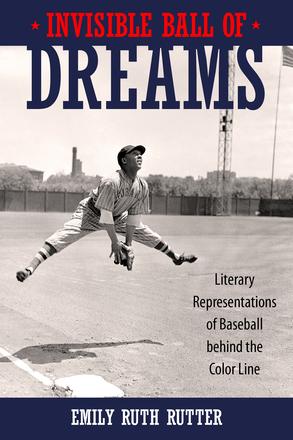
Invisible Ball of Dreams
Literary Representations of Baseball behind the Color Line
How novels, plays, films, poems, and children’s literature fill the archival gaps in Black baseball's story
Description
Winner of the 2018 John Coates Next Generation Award from the Negro Leagues Research Committee of the Society for American Baseball Research
Although many Americans think of Jackie Robinson when considering the story of segregation in baseball, a long history of tragedies and triumphs precede Robinson’s momentous debut with the Brooklyn Dodgers. From the pioneering Cuban Giants (1885-1915) to the Negro Leagues (1920-1960), Black baseball was a long-standing staple of African American communities. While many of its artifacts and statistics are lost, Black baseball figured vibrantly in films, novels, plays, and poems. In Invisible Ball of Dreams: Literary Representations of Baseball behind the Color Line, author Emily Ruth Rutter examines wide-ranging representations of this history by William Brashler, Jerome Charyn, August Wilson, Gloria Naylor, Harmony Holiday, Kevin King, Kadir Nelson, and Denzel Washington, among others.
Reading representations across the literary color line, Rutter opens a propitious space for exploring Black cultural pride and residual frustrations with racial hypocrisies on the one hand and the benefits and limitations of white empathy on the other. Exploring these topics is necessary to the project of enriching the archives of segregated baseball in particular and African American cultural history more generally.
Reviews
"Using the idiom of literary criticism and critical race theory, Rutter (Ball State University) analyzes the ways in which Black baseball has been memorialized, interpreted, and represented in fiction. The old baseball Negro Leagues all dissolved by 1960, but because they were marginalized, as were the historical memory and chronicle of them, the literary representation that followed took on great importance. According to Rutter, the commemoration of Black baseball in literature served to fill the gaps in the historical record, to share the actual archival research that these authors completed in order to create these representations, and to counteract dominant cultural mythologies and stereotypes about Black baseball and about African Americans in general. The author covers works by writers of all races and touches on movies and plays as well as children’s, YA, and adult fiction. Including an extensive, useful bibliography, this engaging, scholarly treatise fills a real need in literary criticism about the depiction of the African American experience in segregated baseball. "
- M. P. Tosko, University of Akron, CHOICE, February 2019, Vol. 56 No. 6
"Rutter may be said to create her own archive at a secondary level. She brings together a body of material not previously linked and constructs effective means by which to read it. Invisible Ball of Dreams is an important contribution to Black cultural and literary history."
- Keith Byerman, professor of English at Indiana State University and author of Remembering the Past in Contemporary African American Fiction
"Invisible Ball of Dreams makes a substantial, provocative, and long-overdue contribution to understanding how African Americans have been subjects—and creators—of writing about baseball. Emily Ruth Rutter’s book is an essential critical text for the study of American sport literature."
- Tim Morris, professor of English at University of Texas at Arlington and author of Making the Team: The Cultural Work of Baseball Fiction
"Historically informed, theoretically sophisticated, and eminently readable, Invisible Ball of Dreams lifts the study of Black baseball literature out of the shadows. Emily Ruth Rutter brings theories of the archive and cultural memory to a number of texts in original ways that will encourage historians and literary critics to rethink the powerful cultural work these texts do. No one seriously interested in Black baseball or in baseball literature can afford to ignore this book."
- Trey Strecker, professor of English at Louisiana State University and editor of NINE: A Journal of Baseball History and Culture